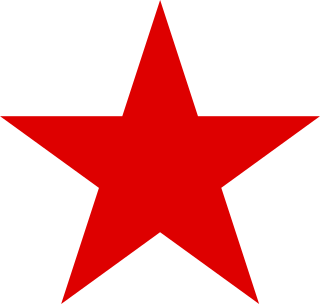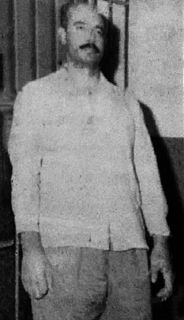
The Syrian Communist Party was a political party in Syria founded in 1924. It became a member of the National Progressive Front in 1972. The party split in two in 1986 with two separate parties claiming to represent the original Syrian Communist Party; the Syrian Communist Party (Unified) and the Syrian Communist Party (Bakdash).
The Arab Socialist Union Party of Syria (ASU) is a Nasserist political party in Syria. ASU is led by Safwan al-Qudsi. The party was formed in 1973, following a split from the original ASU.
The Arab Socialist Revolutionary Ba'ath Party was a ba'athist political party, a splinter group from the Ba'ath Party. The party was led by Abdullah Rimawi and sponsored by the United Arab Republic.
Voting to elect eight members of the Lebanese parliament took place in the Beirut I district on March 24, 1968, part of the national general election of that year. The constituency had 98,439 eligible voters, out of whom 28,631 voted. The elections in Beirut I passed smoothly without violent incidents.
Voting to elect three members of the Lebanese parliament took place in the Beirut II district on March 24, 1968, part of the national general election of that year. The constituency had 34,113 eligible voters, out of whom 17,004 voted.
Voting to elect five members of the Lebanese parliament took place in the Beirut III district on March 24, 1968, part of the national general election of that year. The constituency had 75,296 eligible voters, out of whom 30,713 voted.
Voting to elect two members of the Lebanese parliament took place in the Koura District in 1968, part of the national general election of that year. Both of the seats of the constituency were earmarked for the Greek Orthodox community. Koura District had 31,531 eligible voters, out of whom 13,753 voted. Three tickets contested the election. The election was marred by violent incidents and threats.
Voting to elect two members of the Lebanese parliament took place in the Bsharri District in 1968, part of the national general election of that year. Both of the seats of the constituency were earmarked for the Maronite community. Bsharri District had 32,814 eligible voters, out of whom 16,064 voted. Three separate tickets contested the election. The election was carried out without reports of violent incidents.
Voting to elect five members of the Lebanese parliament took place in Tripoli City in 1968, part of the national general election of that year. Four of the seats of the constituency were earmarked for the Sunni Muslim community, whilst the fifth seat was allocated to the Greek Orthodox community. The Tripoli City constituency had 64,913 eligible voters, out of whom 22,813 voted.
Voting to elect two members of the Lebanese parliament took place in the Batroun District in northern Lebanon in 1968, part of the national general election of that year. Both of the seats of the constituency were earmarked for the Maronite community. Batroun District had 24,331 eligible voters, out of whom 9,458 voted. It had the lowest number of eligible as well as actual voters of all constituencies in the country. Seven candidates contested the election. The constituency witnessed a clash of both organized political parties as well as family interests.
Voting to elect three members of the Lebanese parliament took place in the Zgharta District in northern Lebanon in 1968, part of the national general election of that year. All of the seats of the constituency were earmarked for the Maronite community. Zgharta District had 35,099 eligible voters, out of whom 13,412 voted.
Voting to elect four members of the Lebanese parliament took place in the Akkar District in 1968, part of the national general election of that year. Two of the seats of the constituency were earmarked for the Sunni Muslim community, one seat for the Greek Orthodox and one for the Maronites. Akkar was the most underdeveloped area of northern Lebanon, politically dominated by landlords. The elections were marred by accusations of vote-buying and minor violent incidents. The constituency had 71,899 eligible voters, out of whom 30,282 voted.
Voting to elect eight members of the Lebanese parliament took place in Chouf District on April 7, 1968, as part of the national general election of that year. Three of the seats of the constituency were earmarked for the Maronite community, two for the Sunni Muslim, two for the Druze whilst the last seat was allocated to the Greek Catholics. The Chouf District constituency had 78,557 eligible voters, out of whom 46,056 voted. All in all Chouf District was one of the most hotly contested constituencies in the election, being the home turf of Camille Chamoun and Kamal Jumblatt. The situation in the constituency was tense, but the polls went through without violent incidents. However, Jumblatt did accuse 'a large embassy in Beirut' of buying votes for Chamoun.
On January 10, 1971 a by-poll was held to elect a member of parliament from one of the Sunni Muslim seats from Chouf District in the Lebanese Chamber of Deputies. The constituency was a very sensitive area, as it was the home to arch-rivals Kamal Jumblatt and Camille Chamoun. The election was described by contemporary observers as the 'most fiery Lebanon had ever witnessed in a by-election'. There was a massive presence of security forces deployed in the constituency during the campaign and on the voting day in particular.
Salim Abd an-Nur, a Lebanese Greek Catholic politician. He graduated from the Jesuit School in Beirut, after which he pursued a business career. His political life began in 1959, when he successfully ran for parliament in the by-poll in Chouf District after the killing on the incumbent parliamentarian Na'im Mghabghab. He was re-elected in 1960 as a Progressive Socialist Party candidate, but was defeated in 1964 and 1968.
Voting to elect four members of the Lebanese parliament took place in the predominantly Shia Muslim Marjeyoun-Hasbaya constituency in southern Lebanon on March 31, 1968, part of the national general election of that year. Two of the seats of the constituency were earmarked for the Shia Muslim community, one for the Sunni Muslims and one for the Greek Orthodox. The constituency had 45,849 eligible voters, out of whom 23,224 voted. The polling day was marred by heavy rains.
As'ad Adib Bayudh was a Lebanese Greek Orthodox politician. He was elected to the Parliament of Lebanon from the Marjeyoun-Hasbaya constituency in southern Lebanon in the 1960 and 1964 elections.

Jassem Alwan was a prominent colonel in the Syrian Army, particularly during the period of the United Arab Republic (UAR) (1958–1961) when he served as the Commander of the Qatana Base near Damascus. Alwan, a staunch supporter of UAR President Gamal Abdel Nasser, opposed Syria's secession from the union in 1961, leading two failed coup attempts to overthrow the secessionist government in 1962.




